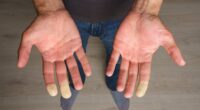For the seventh year in a row, Finland has been ranked as the happiest country in the world by the UN World Happiness Report. But we can all enjoy the benefits of the celebrated Finnish way of life. In their new book, The Power of Hot and Cold, authors Katja Pantzar and Carita Harju show how the Finnish tradition of hot and cold therapy is proven to dramatically boost our mental and physical health.
Canadian journalist, author and daily cold-water swimmer Katja moved to Finland 20 years ago, while Carita is one of Finland’s leading sauna experts and founder of marketing organisation Sauna From Finland.
“Finnish contrast therapy – pairing a hot, steamy sauna session with an icy dip – is the cure for just about everything that ails the mind, body and soul,” says Katja. “The whole body gets a workout as it adapts to changes in temperature.”
HOLISTIC HEALTH: Brace yourself for a long list of hot and cold therapy benefits. Sauna-bathing increases blood flow and quickens the heart rate, the skin’s nerve endings are stimulated, while the temperature of the blood increases and carries heat to all internal organs.
As a result, the sauna improves heart health, boosting circulation and lowering blood pressure. It reduces the incidence of hypertension, dementia and respiratory conditions. It promotes strong immunity, relaxes muscles and reduces stress. The quality of sleep is improved while skin is detoxified.
As well as alleviating headaches and symptoms of flu and Covid-19, it’s even believed to increase your lifespan.
Cold-water swimming, meanwhile, enhances blood circulation and boosts the immune system. It offers relief from pain, arthritis, asthma and migraines, as well as depression, anxiety and PTSD. It stimulates the vagus nerve, creating a sense of wellbeing.
It releases endorphins (the body’s “natural painkillers”), serotonin (which balances mood), and “love hormone” oxytocin. It lowers blood pressure, improves insulin sensitivity and burns calories.
Experiencing the contrast between hot and cold, from sauna to swim, also aids circulation, reduces stress, and enhances muscle recovery. It benefits brain health, and the activation of brown fat burns calories to keep the body warm.
SAFE SPACE: “I see the sauna as holistic,” says Katja. “There’s a list of physiological benefits and studies to prove them. But it also benefits mental health. “You don’t take your phone in so it’s an automatic digital detox. It’s a break from stress and anxiety. You’re often with a group of people in a safe space with no judgment, so there’s a sense of community. Sorry for the pun but there’s also a warm atmosphere.”
The sauna dates back at least 10,000 years in Finland and has always been integral to Finnish life. It’s still known as the “poor person’s pharmacy,” says Carita. “It’s what you do if you’re feeling unwell, if you’re stressed, if you’re tired.”
While Katja only started using saunas 10 years ago, Carita grew up using them routinely, like most Finns. She has a sauna in her backyard and visits every night with her family. Her son was only three weeks old the first time she took him to the sauna to cure his cold.
The sauna’s effects are so powerful, lasting for several hours, that Finnish people typically avoid visiting them before work. “I have a very deep sleep if I go two to four hours before bed,” says Carita. “If I don’t go, my sleep is more disturbed. People often say they don’t go to the sauna in the morning because it makes them too relaxed to get any work done.”
MIX AND MATCH: Katja enjoys even more significant health benefits by alternating her sauna sessions with cold-water swims. She had been living in Finland for a few years before she braved winter swimming in the spirit of trying out a local custom. “I was thinking this is something I have to try so that I could say I’d done it, I really thought it was a one-off. It seemed really bizarre.
“I was standing in my bathing suit on a dock in the middle of Helsinki in the middle of winter and I went in for probably two seconds. I yelped, it was painful and I thought, ‘I cannot understand this’. But really quickly, I had the swimmer’s euphoria, the glow, the happy hormones. It all kicked in and I felt absolutely amazing.”
She was quickly “hooked” on winter swimming and now takes a daily dip in the Baltic Sea. The age range among her group of fellow swimmers spans 10 to 94. “You don’t need to be super fit, you don’t need to be a certain age. It’s open to all.”
Katja is evangelical about the benefits of winter swimming. Despite the initial “breathtaking shock”, she emerges from the water feeling euphoric and invincible. “A short dip allows me to reset my mental and physical being in a matter of minutes. The lure of almost instant relief from my worries, stresses, aches and pains by leaving them in the sea kept me going with this natural form of shock therapy.”
And the benefits Katja experiences are backed up by science. UK researchers used MRI scans to show changes in the brain’s wiring after cold-water immersion to explain why people feel more upbeat and alert afterwards.
Katja likes to alternate between sauna and swimming three or five times in one session. “After that, you feel invincible. You’ve left your worries, tiredness, aches or stress behind in the sea or the steam.”
START SMALL: Katja encourages anyone new to cold-water swimming to build up resilience gradually. “Just dip your leg in for a couple of seconds and that’s a good start. See what your body feels comfortable with and what you can handle, don’t force it.”
A dip of 30-60 seconds in water that’s around 4°C triggers a “hormone storm”, unleashing happy hormones including endorphins (“the body’s natural painkillers”).
But you don’t need to experience extreme cold to enjoy the benefits. Carita, who isn’t a keen cold-water swimmer, points out that your temperature will drop if you simply go outside in cold winter air after a sauna, so you can benefit from hot and cold therapy without venturing into chilly water.
Carita and Katja say that it’s essential to warm up after a cold dip. They also emphasise that anyone with health issues, especially a heart condition, should consult their doctor before they try the sauna or winter swimming. “The rule of thumb is to listen to your body,” says Katja. “Don’t sit in a sauna for 20 minutes if it doesn’t feel right or it’s too hot or you can’t breathe. Just try it out.”
She encourages new sauna users to trust their instincts. “You can sit on the lower benches or next to the door. Stay for a minute, stay for an hour, don’t go for a swim afterwards. We don’t have rules in Finnish saunas. It’s up to you.”
You’re also advised to drink half a litre to a litre of water after a sauna to replace the fluids you sweat out.
FIRST STEPS: Sauna culture is growing fast in the UK, making it increasingly easy to find a sauna local to you. Visit The British Sauna Society for a list of public saunas around the country, some of which also offer barrels or plunge pools for a cold-water plunge. Many gyms and hotels offer sauna facilities.
If you wanted to create the experience at home, saunas usually come with a four-figure price tag, though barrel saunas are available for around £500 and ice baths start at £75. To find a wild swimming spot near you and enjoy the additional benefits of spending time in nature, visit wildswimming.co.uk.
Most importantly of all, says Katja, enjoy your experiences in the world of hot and cold therapy. “You’re taking care of your mind, body and soul in an organic way. Enjoy the benefits but don’t think about the benefits. Think of yourself. It’s for you and your wellbeing. Enjoy your time, focus on your own body, and relax.”
■ The Power Of Hot & Cold, From Sauna To Sea: The Finnish Way To A Happy, Healthy Life is out on November 21 (Yellow Kite, £18.99)










